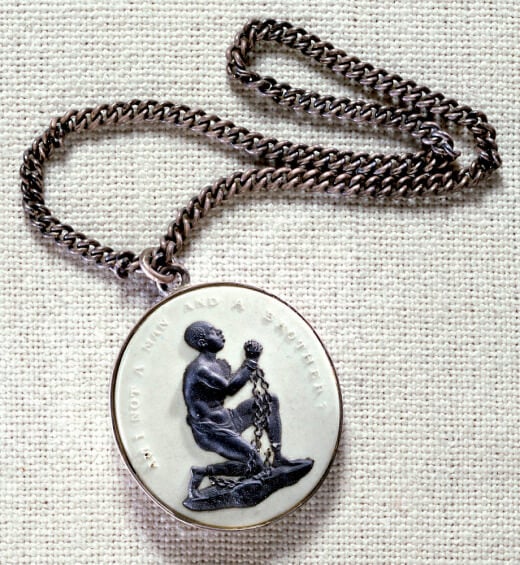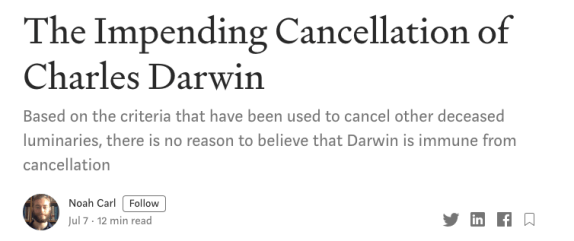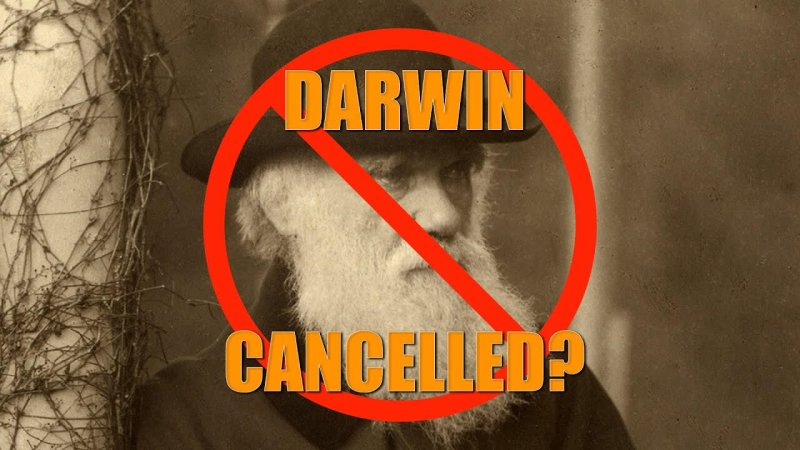
It’s thus possible that Darwin could meet the fate of other scientists who unfortunately didn’t foresee the change in morality in the last century and a half, and his statues and other honorifics could come down. In a piece before the one I’m mentioning today, sociologist Noah Carl (who’s had a bit of tumultuous history, having been canceled himself) wrote in RT about the possibility that Darwin might be canceled because of his views:
In summary, Darwin believed that men were on average more intelligent than women, and that some races were “civilised” whereas others were “savage.” His views on eugenics are not entirely clear (the term was coined one year after Darwin died), but it is obvious from his remarks in The Descent of Man that he believed industrial society could have dysgenic effects. Over the years, many scientists who have expressed views less invidious than these have been defenestrated, and one wonders whether Darwin will now suffer the same fate.
In the piece below from Medium, Carl has gone a bit farther, predicting the impending cancellation of Darwin. I don’t share his fears, mainly because Darwin hedged his bets a bit, was an abolitionist, and I suppose I’m optimistic enough to think that Darwin’s great contribution to biology—indeed, to all humanity—must outweigh any of the minimal conventional bigotry he espoused during his lifetime. But I guess I could have said that about Jefferson, too, and look what happened to him.

Carl’s method is to give quotes that resulted in the “cancellation” of figures like Hume and Linnaeus, and then quote Darwin on the issue of race, with the quotes not being that different in tenor from those of The Canceled.
Here are a few passages from Darwin, all from The Descent of Man (1871):
The taste for the beautiful, at least as far as female beauty is concerned, is not of a special nature in the human mind; for it differs widely in the different races of man, as will hereafter be shewn, and is not quite the same even in the different nations of the same race. Judging from the hideous ornaments and the equally hideous music admired by most savages, it might be urged that their æsthetic faculty was not so highly developed as in certain animals, for instance, in birds. Obviously no animal would be capable of admiring such scenes as the heavens at night, a beautiful landscape, or refined music; but such high tastes, depending as they do on culture and complex associations, are not enjoyed by barbarians or by uneducated persons.
There are passages similar to this throughout the Voyage of the Beagle, with the terms “barbarian” and “savage” used liberally. Here’s another from The Descent of Man:
Most savages are utterly indifferent to the sufferings of strangers, or even delight in witnessing them. It is well known that the women and children of the North-American Indians aided in torturing their enemies. Some savages take a horrid pleasure in cruelty to animals, and humanity with them is an unknown virtue. Nevertheless, feelings of sympathy and kindness are common, especially during sickness, between the members of the same tribe, and are sometimes extended beyond the limits of the tribe. Mungo Park’s touching account of the kindness of the negro women of the interior to him is well known. Many instances could be given of the noble fidelity of savages towards each other, but not to strangers; common experience justifies the maxim of the Spaniard, “Never, never trust an Indian.”
That alone should be enough to do in Darwin. Why couldn’t he have anticipated the greater enlightenment of 20th-century Europeans. But wait! There’s more!
The belief that there exists in man some close relation between the size of the brain and the development of the intellectual faculties is supported by the comparison of the skulls of savage and civilised races, of ancient and modern people, and by the analogy of the whole vertebrate series. Dr. J. Barnard Davis has proved by many careful measurements, that the mean internal capacity of the skull in Europeans is 92·3 cubic inches; in Americans 87·5; in Asiatics 87·1; and in Australians only 81·9 inches.
You could even make the case that Darwin favored eugenics, but you’d have to do so by taking one of his quotes out of context. (That’s no problem for the Cancel Culture, as we saw from the attack on Steve Pinker.) Here Darwin analogizes humans with artificially selected animals, and suggests that scientific advances have actually led to the hereditary degeneration of humans (this is also from The Descent of Man):
With savages, the weak in body or mind are soon eliminated; and those that survive commonly exhibit a vigorous state of health. We civilised men, on the other hand, do our utmost to check the process of elimination; we build asylums for the imbecile, the maimed, and the sick; we institute poor-laws; and our medical men exert their utmost skill to save the life of every one to the last moment. There is reason to believe that vaccination has preserved thousands, who from a weak constitution would formerly have succumbed to small-pox. Thus the weak members of civilised societies propagate their kind. No one who has attended to the breeding of domestic animals will doubt that this must be highly injurious to the race of man. It is surprising how soon a want of care, or care wrongly directed, leads to the degeneration of a domestic race; but excepting in the case of man himself, hardly any one is so ignorant as to allow his worst animals to breed.
That last sentence is alone sufficient ammunition to cancel poor Charles.
But if you ever see this quote used against Darwin, be aware that although it’s true that medical care has allowed the preservation of genes that would be injurious “in the wild”, Darwin adheres to our own view of what we should do about this—nothing. On the same page he says this:
The aid which we feel impelled to give to the helpless is mainly an incidental result of the instinct of sympathy, which was originally acquired as part of the social instincts, but subsequently rendered, in the manner previously indicated, more tender and more widely diffused. Nor could we check our sympathy, if so urged by hard reason, without deterioration in the noblest part of our nature […] Hence we must bear without complaining the undoubtedly bad effects of the weak surviving and propagating their kind; but there appears to be at least one check in steady action, namely the weaker and inferior members of society not marrying so freely as the sound; and this check might be indefinitely increased, though this is more to be hoped for than expected, by the weak in body or mind refraining from marriage.
Carl concludes that if there’s a valid case for dethroning people like Hume, Galton, Fisher, and Linnaeus for their “retrograde” views on race and white superiority, then you can make an equally compelling case against Darwin. Well, in principle you could, especially if you’re not overly fastidious about viewing the entirety of his views and actions. But I don’t think this will happen.
Carl also concludes—and I agree—that the “defenestration” of figures like those mentioned above is not warranted unless you’re willing to cancel Darwin as well. As we discussed yesterday, morality advances, and if your views were the “received wisdom” of those in an earlier time, you become much less culpable than if you expressed them now.
Jerry A. Coyne, Ph.D is a Professor in the Department of Ecology and Evolution at the University of Chicago and a member of both the Committee on Genetics and the Committee on Evolutionary Biology.
A version of this article was originally posted on Why Evolution Is True and has been reposted here with permission. Why Evolution Is True can be found on Twitter @evolutionistrue
This article first appeared on the GLP October 19, 2020.































